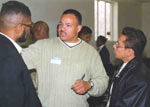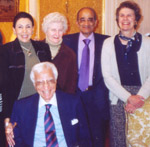 All material ©2006 Initiatives
of Change
All material ©2006 Initiatives
of Change
Other
Event Ideas
Open Homes, Listening Hearts can be hosted in special, creative ways in
different places. The basic concept is to share a meal in your home, but
you could also have “potluck” dinners in community halls or
plan international picnics with area faith congregations and community
groups.
For example, in past years some friends in the Washington, DC, area held a potluck with guests from Bosnia, India, Croatia, Canada, the Republic of Georgia, and Bangladesh, as well as others from the community. In Montreal, Canada, a committee organized a multicultural, multi-faith gathering at a community center with people from 17 countries.
More ideas:
1. Share a hosting of a family with a friend for support.
2. Become a “Twin Family” with a family from another country. Share your respective cultural foods during the month of June.
3. Pair up a church, mosque or synagogue to share together on that day (assisted by an inter-faith network).
4. Have a city/rural exchange.
5. Participate and share in the special feast days and festivals of different cultures and faiths.
6. Establish sporting activities with teams made up of mixed-races.
7. Have a multicultural morning coffee break at work.
8. Have a multicultural picnic/BBQ in the local park, sharing a variety of food from different nations.
9. Visit a nursing home catering to people of another nationality.
10. Have a Street Party or a “Street Swap” party with people from another street.
There are a number of board games designed to facilitate discussion in an enjoyable and creative way. The “Ungame” and “LifeStories,” engage players with questions that invite personal storytelling. They are highly recommended by community and education leaders and are available in stores or online. Using games can make the storytelling time less awkward for many people.
It is important to find ways to engage any children who will be at an Open Homes event. Children (like many adults!) learn best through seeing and doing. Here are some ideas:
1. Maps may help children visualize different countries and the geographic relationship to the US.
2. Children could be asked to bring an item for “Show and Tell.” Parents could help them choose something that represents their culture or religion in some way.
3. Children may also enjoy sharing and seeing family photos, especially of celebrations. These can be a less difficult way for them to explain some of their culture.
|



